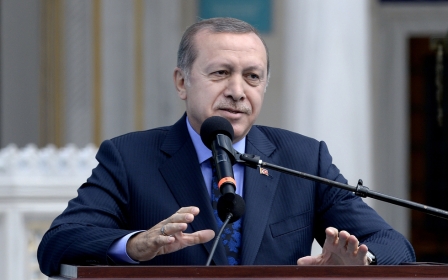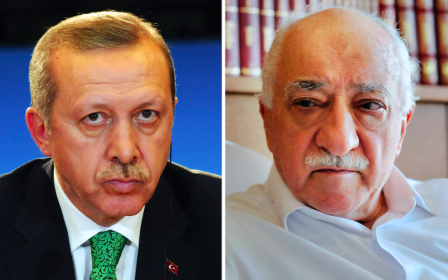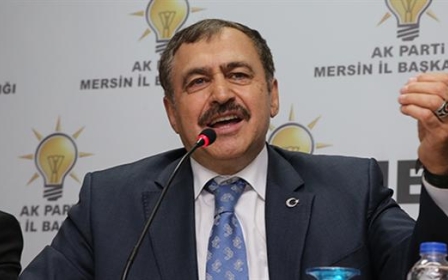Erdogan proposes stripping PKK supporters of Turkish citizenship

Turkish President Recep Tayyip Erdogan on Tuesday suggested that supporters of Kurdish rebels locked in conflict with government troops should be stripped of their Turkish citizenship.
"To prevent them from doing harm we must take all measures, including stripping supporters of the terrorist organisation of their citizenship," Erdogan said in a speech in Ankara, referring to the outlawed Kurdistan Workers Party (PKK).
"These people don't deserve to be our citizens. We are not obliged to carry anyone engaged in the betrayal of their state and their people."
Erdogan has refused to give any quarter to the PKK which has been blamed for a string of attacks in Turkey in recent weeks after the collapse last year of a truce in its decades-long fight for greater autonomy and rights for Kurds.
In March, Erdogan came under fire for calling for the definition of terrorism to be expanded to include journalists, activists and others who "exploit their positions, pens and titles and put them at terrorists' disposal".
But this is the first time he has proposed that supporters of the PKK be stripped of their nationality.
"Supporters (of terror) who pose as academics, spies who identify themselves as journalists, an activist disguised as a politician ... are no different from the terrorists who throw bombs," Erdogan added on Tuesday.
"But like a wolf in sheep's clothing, they serve the same purpose as the members of the terror organisation. As a nation we need to be careful. No one must commit treachery against the state and the nation behind our backs."
Erdogan has also pushed for lawmakers from pro-Kurdish Peoples' Democratic Party (HDP) to be stripped of their parliamentary immunity so they can be prosecuted for "terrorist propaganda".
As part of a growing crackdown on free speech, several Turkish lawyers, journalists and academics have been arrested for criticising the military's heavy-handed tactics in Kurdish-dominated towns and cities in the southeast.
'A pit of treachery'
The PKK launched a bloody insurgency against the Turkish government in 1984 seeking independence, but in the nineties watered down its demands to seek instead more autonomy with cultural and language rights.
Jailed PPK founder Abdullah Ocalan called a truce in March 2013, but tensions over the Syrian conflict kickstarted the violence once again last year.
Turkish forces launched an all-out offensive to eradicate the rebels from urban centres, with a blistering military campaign launched in the southeast.
Erdogan said last week that 355 members of the security forces had been killed in fighting as well as over 5,000 PKK members - although these figures could not be confirmed.
The conflict has also struck the heart of the country, with two attacks in the capital Ankara claimed by Kurdish rebels killing dozens at a time when citizens are already on high alert over bombings by the Islamic State group.
It has also strained diplomatic ties between Turkey and the US, which supports Kurdish militia in Syria which Ankara see as a branch of the PKK.
As part of a wider crackdown that rights groups say violates free speech, Erdogan has particularly homed in on those seen to be supportive of the PKK.
Prosecutors in January launched a major investigation against more than 1,200 Turkish academics who signed a petition denouncing the military operations against Kurdish rebels in the southeast that enraged Erdogan.
Days later, Erdogan personally warned the academics they would "pay a price" after falling into a "pit of treachery".
In mid-March three prominent Istanbul academics were arrested on charges of publishing "terrorist propaganda".
A fourth, Mercal Camci, is facing up to 7.5 years in jail following his arrest after returning to Turkey from abroad on 31 March.
Accused of increasing authoritarianism, Erdogan's government has also targeted journalists, with the president himself this week brushing off all criticism and declaring he doesn't need "lessons in democracy" from the West.
Two journalists from the leading opposition daily Cumhuriyet are currently facing life in prison after being charged with revealing state secrets over a story accusing the government of seeking to illicitly deliver arms to rebels in Syria.
New MEE newsletter: Jerusalem Dispatch
Sign up to get the latest insights and analysis on Israel-Palestine, alongside Turkey Unpacked and other MEE newsletters
Middle East Eye delivers independent and unrivalled coverage and analysis of the Middle East, North Africa and beyond. To learn more about republishing this content and the associated fees, please fill out this form. More about MEE can be found here.




